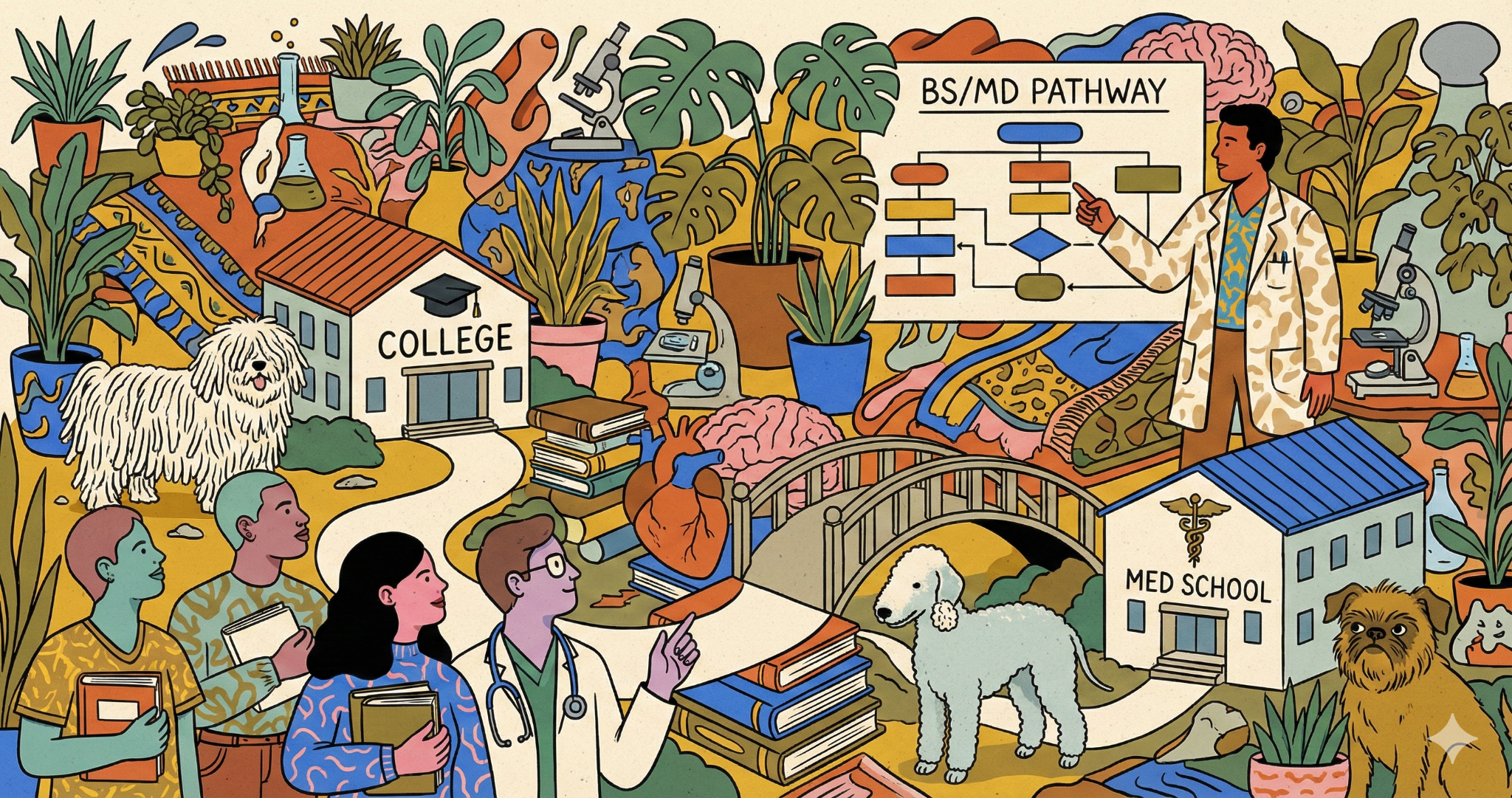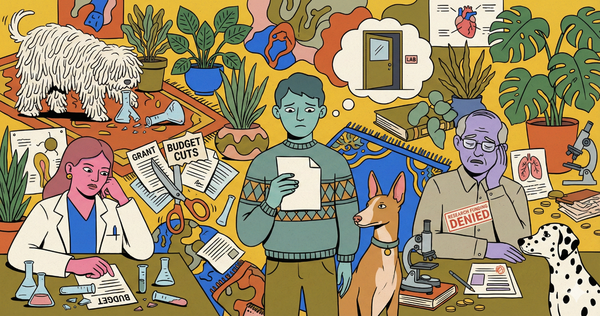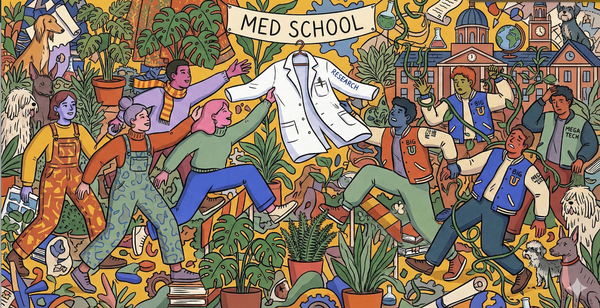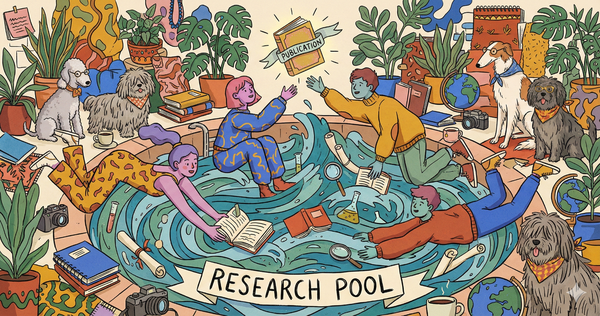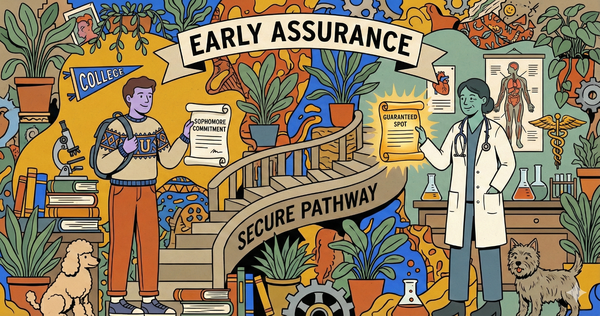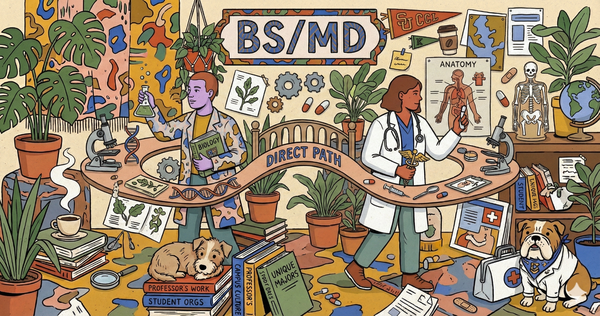

Every year, thousands of students apply to medical school with a perfect GPA, sky-high MCAT, and a checklist of shadowing hours, lab work, and leadership roles.
Most won't get in.
In 2023, the average med school matriculant had a 3.77 GPA and a 511.7 MCAT. Applicants with stats above that threshold still get rejected.
Why? Because they’re forgettable.
The essay reads like ChatGPT. Most aspiring doctors look good on paper, and that's the problem. Colleges don't want applicants on paper; they want someone who stands off the page in 3D.
People often seek out doctors or STEM geniuses to help with their applications for pre-med and direct medical programs. That's a mistake.
For American medical schools, high numbers are the baseline. But personality, humanity, and charisma get you to the finish line. You need someone with high emotional intelligence, boldness, and a creative flair to succeed.
Successful pre-med applicants express their thoughts about mitochondria with the vibrance and relatability that an English major writes about Joseph Campbell.
Personal voice, regardless of the major, is king in college admissions. That's what we deliver.

You’re not a spreadsheet. You’re a person. Medical schools want proof.
Top Dog showcases your intellectual curiosity, emotional maturity, ability to grow, reflect, and connect. The story behind your resume becomes the spine of your application. We make sure pre-meds are memorable, grounded, and unmistakably unique.
Biology is the most common major among pre-med students. It’s also one of the least strategic.
Only 43.4% of biology majors are admitted to med school. Compare that to 52.3% for math/statistics majors and 51.8% for humanities majors. Why? Because admissions committees are overwhelmed with cookie-cutter science applicants. A different academic angle can show complexity, creativity, and critical thinking.
But we don’t just throw you into “quirky” majors to stand out. We help you find the major that fits your brain, your values, your edge. Then we use that to sharpen your narrative. Maybe you’re a sociologist at heart, fascinated by public health systems. Maybe it’s biometry and statistics, and your love for data sets you up for a career in epidemiology. Maybe you care deeply about the ethics of CRISPR and want to study bioethics.
We turn that instinct into strategy.
And because elite colleges are also looking for intellectual diversity, the right-fit major can make you more competitive for undergrad admissions, too, not just med school.
Getting into BS/MD, early assurance, or guaranteed-entry programs isn’t just about grades. Bypassing more exams is largely about how you present yourself, which includes essays, interviews, standardized situational tests, letters of recommendation, and other assessments.
You will need an incredible 650-word Common App or portal essay + several program supplements (250–500 words each), all focused on why med school, why this specific program, why you . These programs require 1–2 rounds of interviews (might include an undergrad round + med school-specific round, sometimes in the same weekend!)
Increasingly, programs want to know how you think under pressure—and whether you have the emotional intelligence to one day sit across from a patient who’s terrified, angry, or dying. That’s where the Situational Judgment Test (SJT) comes in.
The most common one is the Casper, a 90-minute online exam used by medical schools (and some undergraduate programs) to measure your ethics, empathy, communication, and professionalism. You’re given a series of scenarios—some medical, some personal, some awkward—and asked to explain what you’d do. There are no right answers, but there are very telling ones.
It’s not about gaming the system. It’s about revealing who you are when no one’s watching.
Many programs also require Snapshot, a one-way video interview where you answer short personal questions (“Why medicine?”, “What’s your greatest strength?”) on camera, no retakes. Your tone, clarity, and authenticity matter just as much as your answer.
These tools are becoming standard in programs like Drexel, UIC-GPPA, and Hofstra because they help schools weed out the students who look good on paper but can’t show up when it matters.
Top Dog builds your character on paper and in person.
We guide you through essay development that brings out voice, clarity, and depth. We coach you on how to interview like someone who actually has something to say. Then, we deepen your presence through ethics debates, service reflection, and public speaking, so your maturity doesn’t have to be guessed at. It’s visible.
We take each of these components and make them unmistakably yours. No generic replies.
Supplemental Essay Coaching - We help break down each prompt (“Why this program?”, “Ethical dilemma?”, “Personal growth?”) to unearth your real motivations and voice.
Casper & Situational Prep - We train your ethical reasoning, situational judgment, and SnapShot presentation, so those tools don’t trip you up.
Mock Interviews + MMI Training - We offer full practice rounds (undergraduate + med school), mixing classic Q&A (“Tell me about yourself”, “Why medicine?”) and MMI stations: communication, teamwork, on‑the‑spot thinking. Given that we know you, we'll have meaningful advice on how to deepen your answers and make them more authentically powerful.
Letters & Application Review - We tell you who to ask for letters and how to brief them. We polish your resume and activities list to highlight depth, not just breadth. Then, we review your complete application so every word, every activity fits your personal narrative like puzzle pieces.
Everyone applying is impressive. Not everyone is unforgettable.
Top Dog helps pre-med students become applicants with a compelling story, effective strategy, and substance. The kind that gets remembered. The kind that gets accepted.
Ready to be one of them? Let's talk.

